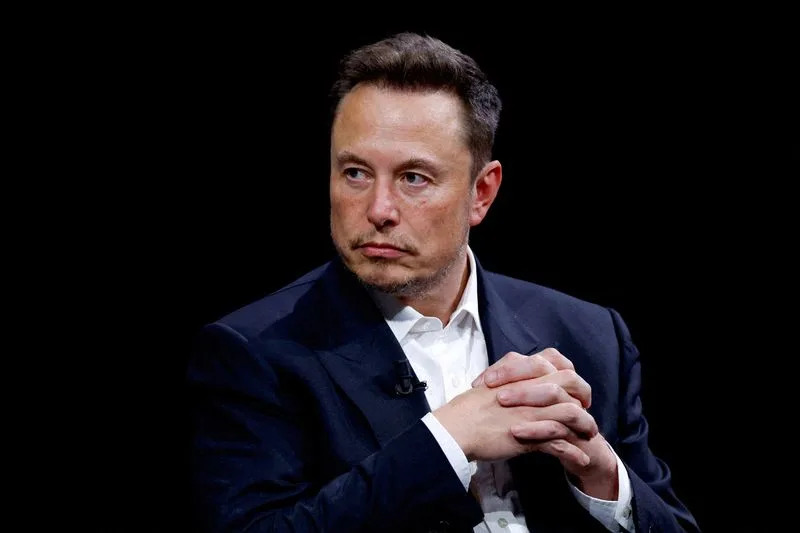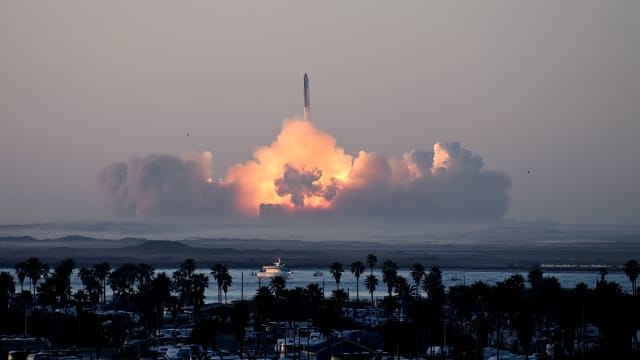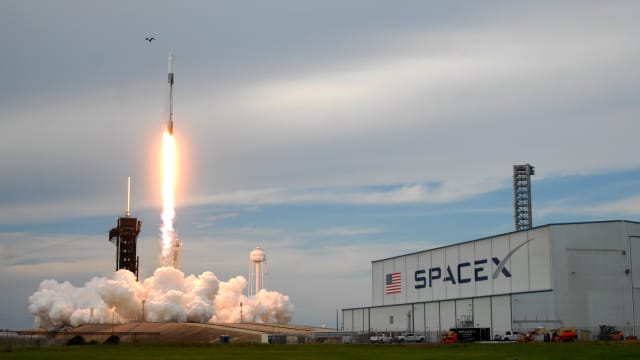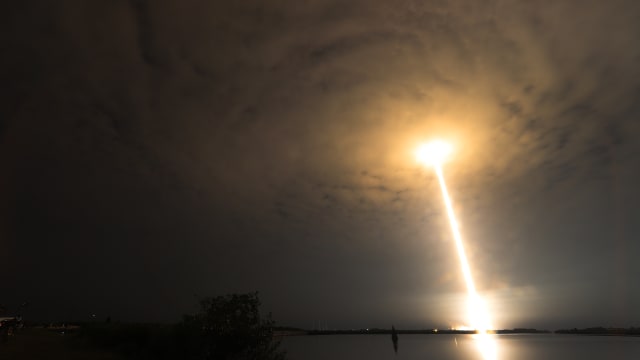David Shepardson
Tue, December 12, 2023

Tesla CEO and X owner Elon Musk attends the VivaTech conference in Paris
WASHINGTON (Reuters) - The U.S. Federal Communications Commission on Tuesday reaffirmed its 2022 decision to deny SpaceX satellite internet unit Starlink $885.5 million in rural broadband subsidies.
The FCC said the decision impacting Elon Musk's space company was based on Starlink's failure to meet basic program requirements and that Starlink could not demonstrate it could deliver promised service after SpaceX had challeged the 2022 decision.
"The FCC followed a careful legal, technical and policy review to determine that this applicant had failed to meet its burden," FCC Chair Jessica Rosenworcel said.
The FCC cited among its reasons SpaceX's failure to successfully launch its Starship rocket, saying "the uncertain nature of Starship's future launches could impact Starlink's ability to meet" its obligations.
The FCC had rescined the funding in August 2022 based on speed-tset data after Starlink had agreed to provide high-speed Internet service to 642,000 rural homes and businesses in 35 states.
SpaceX said it was "deeply disappointed and perplexed" by the FCC decision, adding Starlink "is demonstrably one of the best options - likely the best option" to accomplish the goals of the rural internet program.
The two Republican commissioners on the five-member FCC dissented from the decision saying the FCC was improperly holding SpaceX to 2025 targets three years early and suggesting the Biden administration's anger toward Musk was to blame.
FCC Commissioner Brendan Carr said the commission was joining "the growing list of administrative agencies that are taking action against Elon Musk’s businesses" and said the decision "certainly fits the Biden Administration’s pattern of regulatory harassment."
Musk said in a post on X the FCC decision "doesn’t make sense. Starlink is the only company actually solving rural broadband at scale! They should arguably dissolve the program and return funds to taxpayers, but definitely not send it (to) those who aren’t getting the job done."
Republican FCC Commissioner Nathan Simington, who noted Starlink had about two million subscribers in September 2023, added: "SpaceX continues to put more satellites into orbit every month, which should translate to even faster and more reliable service."
(Reporting by David Shepardson; Editing by Stephen Coates)
Elon Musk goes after Biden Administration following $900 million SpaceX loss
Musk doesn't agree with the FCC's recent decision.
Musk doesn't agree with the FCC's recent decision.
THE STREET
Dec 13, 2023
The U.S. Federal Communications Commission on Dec. 12 reaffirmed its 2022 decision to reject SpaceX's application for nearly $900 million in broadband subsidies.
Following SpaceX's challenge of the initial decision, the FCC said in a statement that Elon Musk's space company failed to "meet basic program requirements" in its bid to receive funding through the Rural Digital Opportunity Fund program.
The program is meant to expand broadband access in rural areas.

The critical differences between Elon Musk's first and second Starship flight
The FCC said that, after passing an initial application stage, SpaceX later failed to demonstrate to the agency that it "could deliver the promised service." The agency said in its statement that funding the request would "not be the best use of limited" resources.
“The FCC followed a careful legal, technical and policy review to determine that this applicant had failed to meet its burden," FCC Chair Jessica Rosenworcel said in a statement.
Brendan Carr, a Republican commissioner on the FCC, wrote in a dissenting opinion that the FCC's decision "cannot be explained by any objective application of law, facts or policy," suggesting instead that it is actually the result of what he called the Biden Administration's "pattern of regulatory harassment" of Musk.
Carr said that the agency was unfairly holding SpaceX to 2025 service expectations, rather than assessing if the company's Starlink service would be capable of meeting those expectations by 2025.
The decision, Carr said, will leave rural communities "stuck on the wrong side of the digital divide."
Musk, agreeing with Carr's statement, said that the decision "doesn't make sense."
Starlink, he said, is the only service that is actively "solving rural broadband at scale."

Why Elon Musk's SpaceX is a major driver for the space industry
"What actually happened is that the companies that lobbied for this massive earmark (not us) thought they would win, but instead were outperformed by Starlink, so now they’re changing the rules to prevent SpaceX from competing," Musk said.
The billionaire added that the Rural Digital Opportunity Fund ought to be dissolved and the funds returned to the taxpayers.
In September, Musk, responding to a Wall Street Journal editorial that questioned whether the Biden Administration had "it in" for him, said: "Sure seems that way."

SpaceX completed its second test flight of Starship in November.
TIMOTHY A. CLARY/Getty Images
SpaceX alone, as of April 2023, has received more than $15.3 billion in government awards since 2003, according to The Information.
SpaceX's Starlink service earned the company $1.4 billion in revenue in 2022, a significant increase from the $222 million it earned the year before.
The company expects to earn $15 billion in revenue in 2024, with Starlink alone responsible for a $10 billion share.
But even as Musk works to expand the internet service, which boasts a constellation of more than 5,000 satellites, its growth has been tainted by concerns over the geopolitical role the satellite arm has granted him.
Investors, meanwhile, remain excited about the many revenue opportunities associated with Starlink, with some expecting to see a Starlink spinoff and IPO sooner, rather than later.

Elon Musk has even bigger plans for SpaceX next year

BY IAN KRIETZBERG
is a breaking/trending news writer for The Street with a focus on artificial intelligence and the markets. He covers AI companies, safety and ethics extensively. As an offshoot of his tech beat, Ian also covers Elon Musk and his many companies, namely SpaceX and Tesla.
Dec 13, 2023
The U.S. Federal Communications Commission on Dec. 12 reaffirmed its 2022 decision to reject SpaceX's application for nearly $900 million in broadband subsidies.
Following SpaceX's challenge of the initial decision, the FCC said in a statement that Elon Musk's space company failed to "meet basic program requirements" in its bid to receive funding through the Rural Digital Opportunity Fund program.
The program is meant to expand broadband access in rural areas.

The critical differences between Elon Musk's first and second Starship flight
The FCC said that, after passing an initial application stage, SpaceX later failed to demonstrate to the agency that it "could deliver the promised service." The agency said in its statement that funding the request would "not be the best use of limited" resources.
“The FCC followed a careful legal, technical and policy review to determine that this applicant had failed to meet its burden," FCC Chair Jessica Rosenworcel said in a statement.
Brendan Carr, a Republican commissioner on the FCC, wrote in a dissenting opinion that the FCC's decision "cannot be explained by any objective application of law, facts or policy," suggesting instead that it is actually the result of what he called the Biden Administration's "pattern of regulatory harassment" of Musk.
Carr said that the agency was unfairly holding SpaceX to 2025 service expectations, rather than assessing if the company's Starlink service would be capable of meeting those expectations by 2025.
The decision, Carr said, will leave rural communities "stuck on the wrong side of the digital divide."
Musk, agreeing with Carr's statement, said that the decision "doesn't make sense."
Starlink, he said, is the only service that is actively "solving rural broadband at scale."

Why Elon Musk's SpaceX is a major driver for the space industry
"What actually happened is that the companies that lobbied for this massive earmark (not us) thought they would win, but instead were outperformed by Starlink, so now they’re changing the rules to prevent SpaceX from competing," Musk said.
The billionaire added that the Rural Digital Opportunity Fund ought to be dissolved and the funds returned to the taxpayers.
In September, Musk, responding to a Wall Street Journal editorial that questioned whether the Biden Administration had "it in" for him, said: "Sure seems that way."

SpaceX completed its second test flight of Starship in November.
TIMOTHY A. CLARY/Getty Images
SpaceX alone, as of April 2023, has received more than $15.3 billion in government awards since 2003, according to The Information.
SpaceX's Starlink service earned the company $1.4 billion in revenue in 2022, a significant increase from the $222 million it earned the year before.
The company expects to earn $15 billion in revenue in 2024, with Starlink alone responsible for a $10 billion share.
But even as Musk works to expand the internet service, which boasts a constellation of more than 5,000 satellites, its growth has been tainted by concerns over the geopolitical role the satellite arm has granted him.
Investors, meanwhile, remain excited about the many revenue opportunities associated with Starlink, with some expecting to see a Starlink spinoff and IPO sooner, rather than later.

Elon Musk has even bigger plans for SpaceX next year

BY IAN KRIETZBERG
is a breaking/trending news writer for The Street with a focus on artificial intelligence and the markets. He covers AI companies, safety and ethics extensively. As an offshoot of his tech beat, Ian also covers Elon Musk and his many companies, namely SpaceX and Tesla.
No comments:
Post a Comment